
The 11-member science team, including foreign scientists, who carried out the fourth National Scientific Research Expedition, returned to Türkiye after completing their one-month-long mission.
The team worked worked on 16 projects in the Arctic’s marine area, focusing on weather, atmosphere, physical sciences and life sciences, with a significant emphasis on the causes and effects of global climate change.
Expedition Coordinator Burcu Özsoy, speaking at the airport, announced the successful completion of their twelfth polar expedition, which included eight in Antarctica and four in the Arctic.
“Scientific studies at the poles are incredibly valuable in understanding climate change,” Özsoy stated. “The work done by Turkish scientists in both Antarctica and the Arctic, followed by detailed analyses and scientific publications.”
Özsoy elaborated on the broad scope of their research, highlighting various categories under the umbrella of climate change. “Our studies encompass life sciences, physical sciences, earth sciences, and social sciences.
The Arctic, an oceanic area not owned by any country, requires evaluation from multiple perspectives including social implications,” she said.
She also emphasized the economic impacts of climate change, noting the potential for new sea routes in the north and access to previously unreachable points in the south due to ice retreat.
Sharing initial findings from their fieldwork, Özsoy pointed out, “The northern regions are experiencing a greater increase in temperatures compared to the south. The point where our team reached the northern sea ice has varied each year, indicating significant environmental changes. It’s crucial that this research continues, as our scientific data is comparable to those countries with a century-long history of polar research.”
Expedition Leader Ersan Başar described their intensive work during the expedition, which involved sampling at 51 stations, with a focus on marine pollution.
“These samples will be analyzed in laboratories at five Turkish universities, yielding valuable results.”